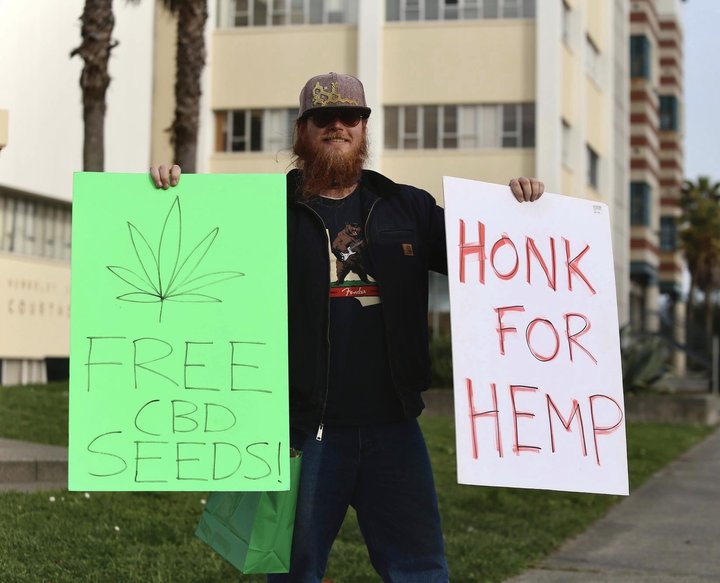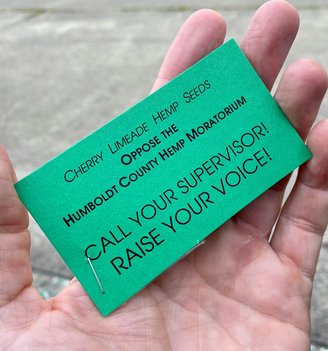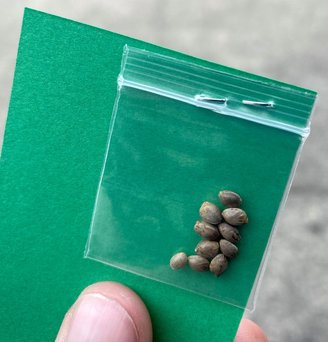
Hemp activist Benjamin Franklin Grant protests the county’s hemp moratorium outside the Humboldt County Courthouse on Monday. | Photo by Andrew Goff.
###
A time-traveling weed legalization activist from three or four decades ago would probably be confused to arrive in present-day Humboldt County and learn that marijuana is legal while cultivating hemp, weed’s fibrous, non-psychoactive sibling, remains banned throughout the unincorporated land. Yet here we are.
On Thursday, the Humboldt County Planning Commission unanimously voted to indefinitely extend the county’s industrial hemp moratorium, which has been in effect since May 2019, and to forward an ordinance to the Board of Supervisors that would make the prohibition permanent.
There are a couple of exceptions to the ban. First, College of the Redwoods will have permission to seek a special permit that, if approved, would allow hemp to be grown for educational and research purposes on the school’s main campus, just south of Eureka.
Secondly, as the word “industrial” suggests, the ban is meant to prevent commercial-scale operations, so the “personal use” size limits in the county’s Commercial Cannabis Land Use Ordinance (CCLUO) will apply to hemp as well. That means people can grow up to six hemp plants or maintain 100 square feet of cultivation on parcels smaller than an acre; up to 200 square feet on parcels of one to five acres; and up to 400 square feet on parcels larger than that.
Also, individual cities can make their own rules. They can implement their own bans on industrial hemp, as both Blue Lake and Fortuna have done, but if they don’t, hemp cultivation is permitted by default.
In 2020, the Humboldt County Agricultural Commissioner’s Office registered two industrial hemp growers — one growing in Arcata and the other in Rio Dell, according to Ag Commissioner Jeff Dolf. In an email on Monday Dolf said, “We also were contacted by a business in Arcata which expressed interest in producing industrial hemp nursery stock, but as yet have not received a completed application from the interested party.”
Why the ban in the rest of the county? Well, in a series of public hearings and workshops held in 2019, quite a few local cannabis growers came out and voiced concerns that industrial hemp could produce uncontrolled pollen drift along with pests and pathogens that might contaminate their own crops, potentially destroying large swaths of the region’s lucrative commercial cannabis.
This whole debate erupted in 2019 after the federal government — somewhat unexpectedly — lifted its longstanding ban on hemp cultivation with passage of the 2018 farm bill. While hemp has historically and most commonly been grown as a source of durable fiber, used to produce rope, textiles and paper, etc., it can also be cultivated as a source of cannabidiol, aka CBD, a compound that has blossomed into its own lucrative industry. CBD is now regularly infused into food, health and beauty products and marketed as a treatment for conditions such as anxiety, epilepsy, pain and even cancer, though the scientific evidence for those claims remains thin.
While commercial cannabis regulations in California include robust — some say oppressive — systems of permits, fees and taxes, federal legalization of hemp meant that it can be grown more or less like any other agricultural crop. In California that means little more than registering your grow site with your county’s agricultural commissioner and paying a $900 fee.
Some growers saw hemp cultivation as a back door that would allow them to produce a lucrative cash crop legally without being overburdened by regulations. Others maintained the libertarian argument that the government has no business telling people what crops they can and can’t grow on their own land.
At Thursday’s Planning Commission hearing, SoHum resident and regular hemp advocate Benjamin Jefferson Franklin Grant spoke against the moratorium.
“There are potential threats to the local cannabis industry from cross-pollination and pests,” he allowed, “but those aren’t problems that we can’t solve.”
The public workshops held last year informed the development of an eight-page draft ordinance aimed at establishing local rules for the industry, and Grant argued that the necessary protections — including allowing only female hemp plants as a means of preventing pollen drift — were baked in.

Frustrated with the Planning Commission’s decision, Grant took to the street in protest. On Monday he stood outside the Humboldt County Courthouse with picket signs — “Honk for Hemp,” one read — and handed out free packets containing six 10 feminized hemp seeds apiece. (Only males and the occasional hermaphroditic plant are capable of producing pollen.) Grant said he plans to go back and hand out seeds again on Tuesday as an act of civil disobedience.
Describing himself as a hemp grower and researcher with a degree in horticulture from the University of Southern Illinois, Grant said he grew 120 acres of CBD hemp in 2019 and has a seed labelers license in Wisconsin.

As for the Planning Commission’s recommendation to make the ban permanent, Grant said defiantly, “Nothing’s permanent in a democracy.”
But local cannabis industry insiders remain steadfastly opposed to industrial hemp. Ross Gordon, policy director for the Humboldt County Growers Alliance, said that the scale of industrial hemp operations can reach thousands of acres, making it virtually impossible for local officials to inspect each individual plant and ensure that they’re feminized. (The state defines industrial hemp as a cultivation area of at least one-tenth of an acre, or 4,325 square feet.)
Gordon also said the genetics of hemp plants are not as stabilized as plants with higher levels of THC, the psychoactive compound in cannabis. This creates a higher likelihood of male and hermaphroditic plants, he said. And while cannabis regulations include stringent restrictions on pesticide and water usage, those rules don’t apply to hemp cultivation. [CORRECTION: Dolf informed the Outpost, “The same pesticide laws that apply to high-THC cannabis also apply to industrial hemp.” Gordon acknowledged this, though he noted that cannabis products face more scrutiny and accountability because they must be tested for pesticides, herbicides, heavy metals and other contaminants.] Hence the concerns about pests and pathogens.
The HCGA sent the Board of Supervisors a six-page white paper in November outlining their arguments against allowing industrial hemp production in Humboldt County.
Asked if he had any objections to Grant handing out free seeds at the courthouse, Gordon said, “Not at all. Prop. 64 says everyone gets to grow six plants, so I think that’s awesome. People should get their personal use.”
The Board of Supervisors have yet to set a date to consider the industrial hemp moratorium.
###
PREVIOUSLY:
- Yurok Tribe Gives Thumbs-Up to Hemp: Tribal Council Moves to Legalize Non-Psychoactive Cannabis on Tribal Lands, Develop Regulations and Explore Business Opportunities Around Newly Legal Crop
- County Looks to Extend Moratorium on Industrial Hemp Cultivation While Developing New Rules and Regulations
- Will a Lapse in the County’s Hemp Moratorium Inadvertently Open the Floodgates for Industrial Cultivation?
- County Ag Commissioner Accepting Hemp Registration Forms Ahead of Moratorium Vote
- TODAY IN SUPES: Hemp Moratorium Reinstated
- (UPDATE: Letter Approved) Supes May Ask State Officials to Close ‘Loophole’ Allowing High-CBD Cannabis to be Grown as Hemp
- (MAPS) Here’s Where the County Might Allow You to Grow Industrial Hemp
- TODAY IN SUPES: A Protest Song, a Likely Hemp Moratorium Extension and the End of Columbus Day
CLICK TO MANAGE